A select group of prominent Hungarian lawyers gathered at Dentons’ Budapest office on April 6, 2016, for a CEE Legal Matters Round Table conversation about the state of and prospects for the Hungarian economy and the Hungarian legal market. The 90-minute conversation touched on topics including the encouraging signs of recovery, the effects of the “soft nationalization” carried out by the Hungarian government in various sectors, fee trends, and changing expectations of the new generation of lawyers.
Hungary is “Well-Positioned”
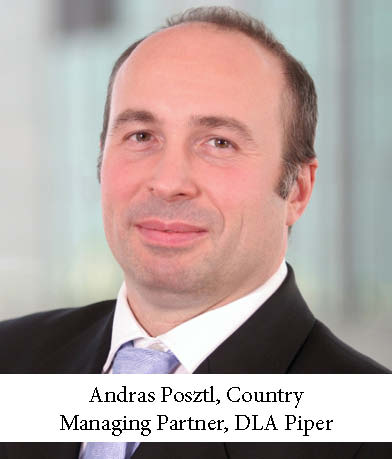
DLA Piper Hungary Managing Partner Andras Posztl started the discussion on a positive note by explaining that, at least from an international law firm perspective, “the market is nothing close to the 2010/2011 years – in a good way.” Indeed, he said, “the feel is closer to 2007, at least in terms of utilization rates facilitated by plenty of transactions around.” He noted that firms were benefiting from “both positive global trends and local nuances,” and explained that the “robust growth of CEE economies in 2015 … appears to be continued this year too.” In addition, he said, “healthy labor markets and low inflation both support sustainable growth.”
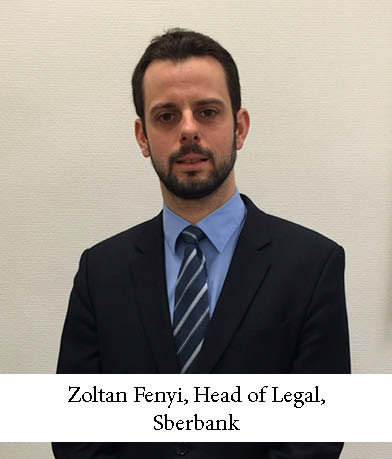
The in-house participants said that the news from their respective sectors was similarly encouraging. Zoltan Fenyi, Head of Legal at Sberbank, reported “overall good news: we see a definite development on both the retail and corporate side.” He added: “The retail business is fueled by the growing consumption of private individuals, and SMEs are fueled by the new National Bank Growth Scheme, which is a significant refinancing program aiming at boosting the SME finance activity of the financial institutions.”
Daniel Szabo, Country Counsel for Hungary at Hewlett Packard Enterprise, was similarly upbeat about prospects in the IT sector. According to Szabo, “I am optimistic, over
all, since many major private sector players have been putting off their IT investments for years, and now they need to make a quantum leap – and we feel we’re in a very good position to meet that demand.”
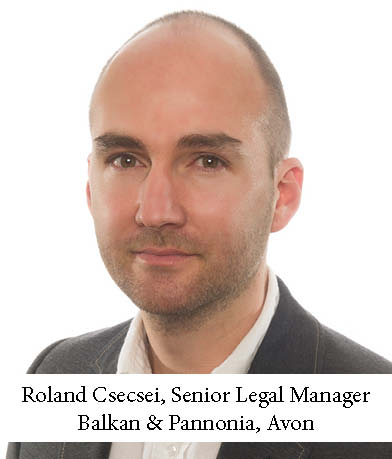
And Roland Csecsei, Regional Counsel Legal & Corporate Affairs at Avon, said the news from the FMCG sector was equally positive. “We are seeing development in the industry with people spending money on different things, and [we are seeing] that Hungary seems to be quite appealing in terms of international investments.” Indeed, Csecsai said, “as a company running a shared service center here I can confirm that compared to CEE the country is well positioned.”
Daniel Szabo agreed that “we’re currently well positioned,” but cautioned that “the world is changing and competing with more and more markets is an increasing reality.”
Summing up, Sberbank’s Fenyi pointed to “some challenges that will pose difficulties in legal terms, such as the upcoming amendments in the Civil Code” but repeated that he was, “overall, quite optimistic about the overall status of the market.”

The discussion shifted to the kinds of deals supporting this encouraging trend. Edward Keller, Partner at Dentons, pointed to two types of transactions he has worked on recently that, in his view, illustrate the state of the market. “On the first I had the pleasure of working together with Zoltan Faludi: The Extreme Digital deal. This is the type of deal I have been hungry for for quite a while now, since it involved a South African company investing in a very dynamic entrepreneurial organization based on a growth story.” He explained that the second type of transaction showed that “investors are seeing past the noise and that there is some great business valuation here leading to us working on three sizeable private equity and real estate deals where investors are looking to buy in markets like Hungary because the market presents some promising profit margins.” He added: “Particularly positive is the thought that PE firms are generally first movers and we’re seeing an enormous amount of deals ongoing at the moment …. The only question at this point is how many of them will actually go through, but even if 50% of them end up panning out we’re in a great place.”
Posztl was “happy to echo” Keller’s positive description of the deal flow in the country and added that “there’s a good amount of deals, particularly looking at the food industry.” He pointed to the growth story of Fornetti [acquired in summery 2015 by Aryzta AG], and to the real estate sector “that is just booming as a result of a PE side that is hungry for investment opportunities in the country.”
Zoltan Faludi, Partner at Wolf Theiss, agreed that Hungary could boast “a good mid-sized corporate/M&A market with a nice series of transactions pending.” He referred to the encouraging and increasing number of CEE-based investors increasingly active in Hungary, which he described as “a matter of locals becoming more mature now and doing more business across the region.”
Not everything is rosy, of course. While Posztl reported increased utilization rates at DLA, he also cautioned that: “new challenges such as financial imbalances and contracting output in China are overshadowing the perspectives of the global economy. These difficulties can also influence the investors’ mood in our region, with possibly a negative effect on M&A activity.”
Another concern was voiced by Faludi, who pointed out that while the real estate sector in Hungary is “booming,” he was concerned about the energy sector. “The government has decided to take a much stronger role in the sector all across the production chain,” he explained, adding: “because of the regulatory interventions combined with the now heavy investments from the side of the state, clients are leaving the country with [the state] taking their place. How this will impact the sector in the long run is uncertain.”

Gabriella Ormai, CMS’s Managing Partner in Budapest, said that the developments Faludi referred to in the energy sector had forced her team to adapt as well. “Definitely, our guys had to change their practice as well in terms of going into brownfield or greenfield investments,” though she noted that they had “adapted to the new market trends, and besides energy work and brownfield and greenfield investments we are now involved in more and more energy-related projects in the chemicals industry.” Finally, she said, “we are expecting some move in the renewable-energy area due to the approaching 2020 deadline of EU renewable energy targets.”
Faludi clarified that his frustration with the Hungarian government’s activity in the energy sector was not related to his company’s bottom line, as “it doesn’t matter if I represent a company leaving or building,” and said that, “of course, as a lawyer, we’re still busy in the short-term – even if it has to do with disputes against the state.”
A “Soft Nationalization” by the Hungarian Government
The Hungarian government’s increased activity in pursuit of a policy of acquisition or re-acquisition in critical sectors (which Tamas Szabo, Managing Partner at Szabo Kelemen & Partners, referred to as “soft nationalization”) was a controversial one for the Round Table participants.
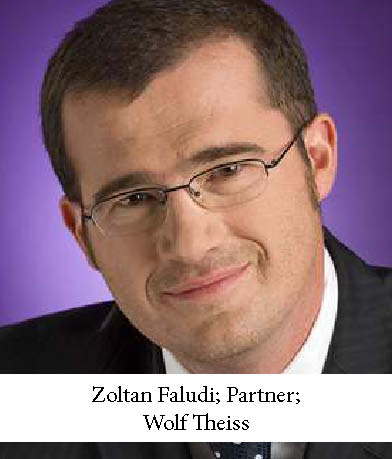 Zoltan Faludi noted that, as his office is staying busy, his frustration is more personal than professional, and reflects his desire to be involved in the development rather than the destruction of a vibrant energy sector. “Personally,” he said, “I prefer building power stations, but, unfortunately, for the last 10 years I’ve seen none, nor any real investments in the infrastructure.” He continued: “The so-called ‘soft nationalization’ does not result in investments and building infrastructure …. Now we’re in a cycle of exits, and I assume the story will repeat itself eventually. If we’re lucky that will happen sooner rather than later.”
Zoltan Faludi noted that, as his office is staying busy, his frustration is more personal than professional, and reflects his desire to be involved in the development rather than the destruction of a vibrant energy sector. “Personally,” he said, “I prefer building power stations, but, unfortunately, for the last 10 years I’ve seen none, nor any real investments in the infrastructure.” He continued: “The so-called ‘soft nationalization’ does not result in investments and building infrastructure …. Now we’re in a cycle of exits, and I assume the story will repeat itself eventually. If we’re lucky that will happen sooner rather than later.”
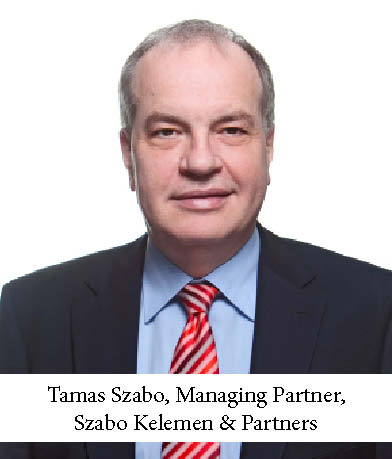
Tamas Szabo noted that the “activist government’s” policy affected sectors beyond energy. “It is important to emphasize that the state has a stronger role in general,” he said, and pointed to the banking sector as well. Still, he noted that, despite Faludi’s concerns about the energy sector, “it does not mean that no investments in the sector happen.” He pointed to a new nuclear power plant
as an example, although he conceded that securing that type of work entails “a need to be even closer to the state.”
The challenge this poses for law firms was explained by Keller, who argued that, in general, “tendering for that type of work will usually change the profitability considerably unless you are working for the private party partnering up for the project.”
Still, Keller pointed out that some of the government’s acquisitions had been received well, pointing out, in particular, that “the [state’s] acquisition of the stock exchange was hailed in the press as genius with a narrative pointing towards a potential IPO boom.” Indeed, Keller reported, the country may be looking at its first potential large IPO since 2001, with a number of companies in the pipeline for going public.
Postzl referred to another positive result of the government’s aggressive approach: “In Hungary, despite the mixed perception of the political landscape, the solid fiscal policy of recent years has helped to consolidate the budget and to essentially improve the government’s position in the financing of state debt.” As a result, he said, “the activity and vividness experienced recently by the clients of business law firms was mainly the result of government policies reshaping the economic landscape and the accelerated use of EU funds in the last quarter of 2015.”
Tamas Szabo nodded his head in agreement, concluding the subject with a brief summary: “This might mean more work for lawyers in the near future – but this might [also] translate into potentially more and more clients becoming state-owned down the line.”
Fees, Boutiques, and the General Commoditization of the Legal Market
The conversation moved to that familiar source of complaint for lawyers: their fees. Roland Csecsei explained that, at Avon, he’s starting to give more work to boutiques, which are able to do the same work as the major firms for lower fees. He explained that, “I just finished a big RFP tender in 9 countries which showed that mid-sized boutiques seem to be very well equipped while much cheaper.” Accordingly, he said, he’s going to “give a chance to more such firms than before, while in critical markets, I’m still keeping the big firms.” He concluded: “My goal is to compare a few years down the line to see what option makes more sense.”
Csecsei emphasized that he wasn’t suggesting that larger firms are always overpriced, referring to opinions he had received from such firms that “were thorough enough that I felt almost immediately it was worth the larger fee,”

Daniel Szabo’s conclusion on the topic was slightly different, saying that the increased number of law firms in the market led to increased competition, so “my impression is that the good old days of uncapped fees will not likely come back.” He conceded that there would always be a few niche fields in which firms would be able to charge a premium, “but generally I expect law services will be getting less expensive.”
Edward Keller at Dentons said he sympathized with clients, saying: “If someone can offer cheaper quality work, you’d have to be insane not to take them up on it,” but warned that they’d be well-advised to explore what they’re getting for their money. Maintaining quality, he said, is key: “I’m just not interested in competing at that level since I’d have to stack up the project with junior lawyers.” Indeed, Keller pointed out that smaller teams are rarely able to bring the necessary expertise and skill to all facets of a matter: “Most of the time you’re looking at someone who was an associate, not a partner, but even if they are senior enough, the fact that they were an IP lawyer in their previous firm doesn’t necessarily mean they can tackle your M&A work properly – you don’t simply learn M&A by osmosis.”
When it was proposed that the downward pressure on fees might be the result of a large number of spin-offs, as has happened in some CEE markets, Gabrielle Ormai shook her head, noting that while this may have been the case in Hungary several years ago, it has been far less common in recent years. She also pointed out that many of those split-offs that appeared several years ago “are actually still around,” indicating that, “at least at the time, there was a market sector to be filled by them.” By contrast, she said, “I am unsure there’s much room left at the moment for others.”
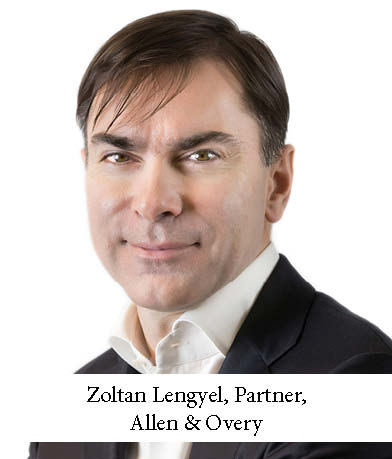
In any event, said Zoltan Lengyel, Partner at Allen & Overy, his firm does not pay much attention to split-offs anyway, as most of the splits are rather small and generally focused on the domestic market. His firm, by contrast, focuses on cross-border deals: “a business model that will let us carry on in the market irrespective of how many such spin-offs occur.” He elaborated: “Our focus is that we are trying to bring in transactions where at least two or three offices are involved.” This, he noted, “justifies the rates you need to have in place in order to be profitable as a global firm – otherwise, it is clear that if you are competing on a purely domestic matter you need to match local rates.”
Of course, it’s not self-evident that the big firms are losing out to the smaller ones. Andras Posztl, while noting that, “it is a client market still,” said that income for firms has been growing somewhat in recent years “due to increasing utilization rates that help the bottom line.” Continuing on the subject, he pointed to a “clear trend of market segmentation” in developed markets, noting “among the AM Law 100, 25% of the top firms account for 50% of the profits, with those at the top end getting increasingly richer and more successful.” He said, “it is my impression that the trend is rather similar in Hungary, especially with those international firms sophisticated enough to meet the tech-driven services demand well suited to capitalize on the trend.” Finally, Posztl referred to a survey he recently read, showing that “on one hand international and larger domestic law firms have typically enjoyed marked recovery and substantial growth in 2015, when many of the international firms surveyed reported double-digit revenue increases, but on the other hand, smaller domestic firms are still suffering from falling revenues and workloads.”
In any event, Keller maintained, firms need to stay competitive by using the technologies that are increasingly available to simplify and deliver certain types of work more quickly – and thus more cheaply. Ormai agreed and explained that: “Yes, we have been focusing on various tech solutions for some time now, and the main driving force is to increase efficiency and to be able to offer more competitive rates.” Tamas Szabo noted that “changing regulations also help us in this process,” explaining that, “we can make more and more filings online, and we can obtain more and more official information from government databases.”
But Daniel Szabo at Hewlett Packard Enterprise pointed out that that law firms aren’t the only ones benefiting from these developments, as the increased use of tech-driven solutions that require less manpower are increasingly applied on the in-house side as well.
“We have to learn how to adapt our services to changing expectations of clients and keep in mind that market realities are changing,” Faludi explained, adding: “15 years ago an M&A loan agreement draft was a ‘biggie’ in the market. Now it’s a commodity. I started my career as a waiter and was always told ‘whatever I do, the restaurant will be full tomorrow’ – this is not that type of busines,s and we need to be very aware of that.”
Gabrielle Ormai agreed: “We’ve seen several cycles of in-house teams’ growth and declines, and firms have always had to adapt. There were times where we had to generalize our service offering since there were no GCs in place, and others where we had to specialize to add value later. We’re now faced with a need to adapt to match the requirements and preference of one point of contact and a standardization of services provided.”
Kids Today
Finally, the conversation turned to the younger generation of lawyers.
Edward Keller insisted that the approach of new lawyers to their work “is very different” from that of his generation. He reported that, “we’re having a much harder time enticing the type of talent we would usually aim for. The idea of working on fascinating deals is not enough anymore. Paying more is no longer enough either. Instead, the 26-year-olds and under are placing a premium on quality of life and are scared to commit to the type of work of law firms at this table. They are also more focused on working abroad or even launching a career on the business side rather than a hardcore law career.” As a result, Keller said, “we are taking active steps in building up a different image. We have a reputation of being a sweatshop, and we are trying hard to fix it. We are trying a softer-attraction-points approach.”
Gabrielle Ormai agreed with Keller’s analysis of the younger generation. “Yes, I also share this view. It is hard to find good and dedicated candidates; and we often feel that fresh graduates do not know what they want (whether it is corporate, property, or employment law that they would like to engage with), are not familiar with the market, and have no work experience.” Like Keller, Ormai also pointed to an apparent lack of drive: “We also regularly attend job fairs of prominent universities, but students are not prepared, have no resumes with them, and do not proactively seek opportunities.”
Fenyi said the problem is the same in-house. “When we are looking for new junior colleagues … we usually come across two main problems: one is quality of knowledge and, more problematic, one is quality of approach.” He added: “I’m unsure if it is a social problem or a matter of education, but younger lawyers seem to not care that much about quality of the work product, and that becomes even more of a problem when we take into account that, ten years ago, banking was a relatively straightforward area of law. Now, it’s a highly regulated sphere which adds just so much more complexity to what’s expected from lawyers in the field, and it is proving difficult to find someone prepared to take on the challenge … and even if you do, it seems questionable if they will succeed in the long run.” This difference, Fenyi argued, “is a great challenge for both companies and private practices.”
Andras Posztl suggested that, in addition to a change in priorities for young law graduates, firms were also facing greater competition for them. “Interestingly,” he said, “we’re competing with the likes of McKinsey or BCG for fresh grads these days, with the young generation seemingly being more interested in the business exposure that these types of consultancies offer.”
Not everyone agreed that the problem exists in the first place. Tamas Szabo noted that his firm has not encountered this problem, and Lengyel suggested that firms need always to adapt to the expectations and needs of their lawyers. “The service we provide is pretty much determined by the people around us. If we face a new attitude of people joining us we also have to adjust. We cannot simply blame a whole generation for [our] not being able to motivate them.”
Finally, Keller referred to one unusual consideration: the so-called “lost generation” of lawyers which “came on stream in 2007 and 2009 but didn’t really get work, who now are forced to compete with their younger counterparts.”
Last Thoughts
In closing, Lengyel referred to all the risks identified by others at the table (including fee pressure, quality of young lawyers, potential threats of declining transactions due to interventionism), but said that, “compared to 2007/2008, if winter is to come, we have time to prepare this time.” His only real concern was related to the Government, and he sighed in frustration: “In Hungary, I fear there is no real rule of law. And I fear that while at the moment the potential risk/value assessment is assumed by potential investors, the private sector is shrinking because of the current approach. For me, it’s bad news as our client base comes from the private sector.” Faludi, who had raised similar concerns when discussing the energy sector early in the conversation, added that, at least for now, it is “good to see that privates are not deterred by default but simply price it in.”
At this point the Round Table drew to a close. We’d like to thank Dentons for hosting the engaging and informative event, and we look forward to reconvening next year.
This article was originally published in Issue 3.2 of the CEE Legal Matters Magazine. If you would like to receive a hard copy of the magazine, you can subscribe here.








 Zoltan Faludi noted that, as his office is staying busy, his frustration is more personal than professional, and reflects his desire to be involved in the development rather than the destruction of a vibrant energy sector. “Personally,” he said, “I prefer building power stations, but, unfortunately, for the last 10 years I’ve seen none, nor any real investments in the infrastructure.” He continued: “The so-called ‘soft nationalization’ does not result in investments and building infrastructure …. Now we’re in a cycle of exits, and I assume the story will repeat itself eventually. If we’re lucky that will happen sooner rather than later.”
Zoltan Faludi noted that, as his office is staying busy, his frustration is more personal than professional, and reflects his desire to be involved in the development rather than the destruction of a vibrant energy sector. “Personally,” he said, “I prefer building power stations, but, unfortunately, for the last 10 years I’ve seen none, nor any real investments in the infrastructure.” He continued: “The so-called ‘soft nationalization’ does not result in investments and building infrastructure …. Now we’re in a cycle of exits, and I assume the story will repeat itself eventually. If we’re lucky that will happen sooner rather than later.” 

